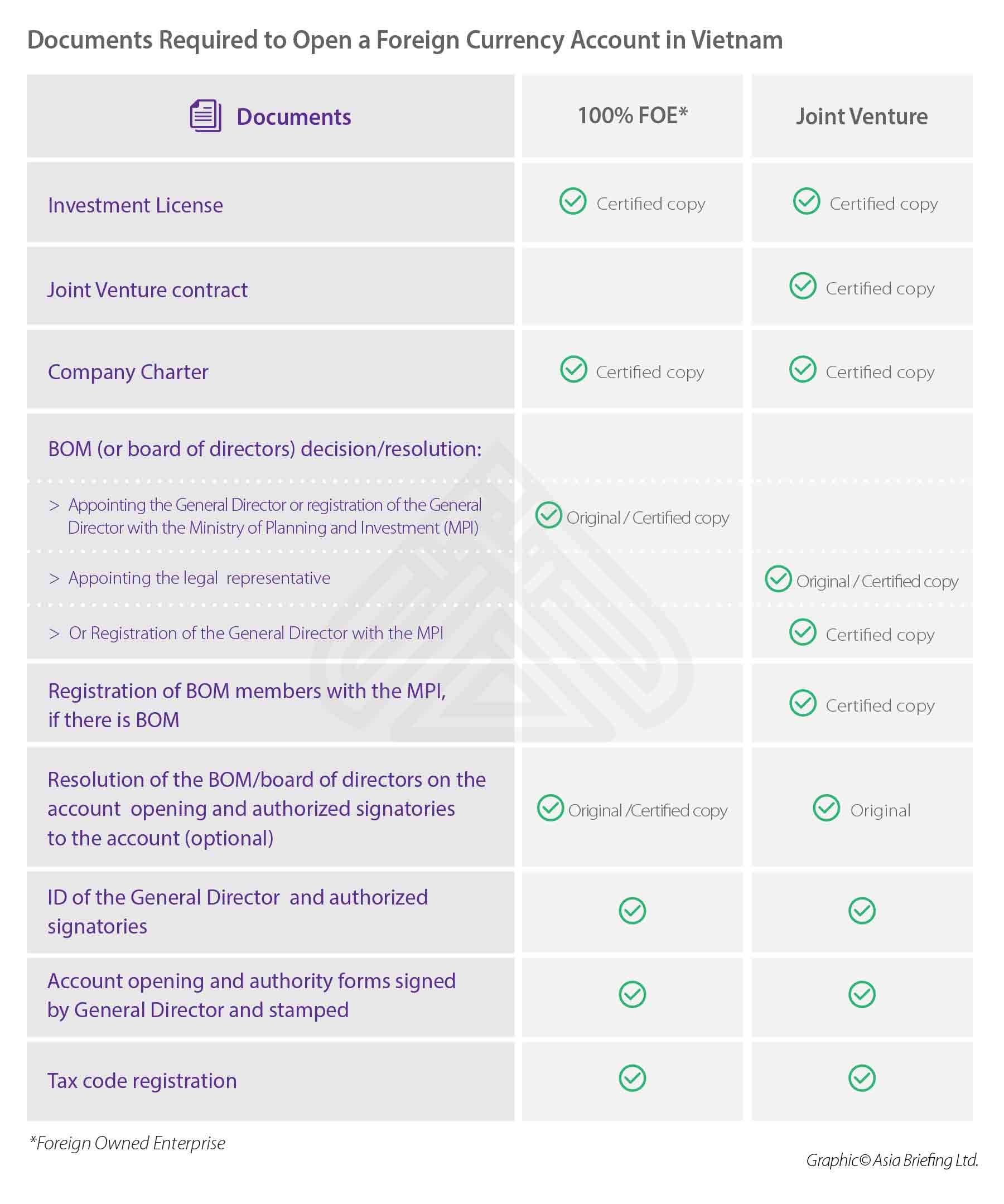One of the first decisions that will have to be made by investors is that of banking. Several accounts may be required, including a direct investment capital account (DICA), payment account in foreign currency or local currency, and possibly others. Certain restrictions apply to which institutions are supported, which accounts can be opened, and what type of transactions each account type can support.
For newly established FIEs, after obtaining an investment and enterprise registration license, normally all capital bank accounts and payment accounts in both foreign currency and VND can be opened at the same time. The VND payment account can receive bank interest according to the current interest rate structure.
A DICA shall be used by those considering Vietnam as a destination for future investment, for finalizing initial investment banking arrangements.
Contrary to DICA, FIEs can open as many payment accounts in foreign currency or local currency as required.
Account types and purposes
Under Circular 06/2019/TT-NHNN, an FIE can open two types of bank accounts: a direct investment capital account and payment accounts at an authorized bank.
I. Direct investment accounts
a. Direct investment accounts in foreign currency, or Vietnamese dong
The application dossier may include:
- Bank account opening form;
- Notarized photocopies of documents proving legal status, including Decision of Enterprise Establishment, and Business License or Investment License;
- A copy of the approval on investment in the foreign language and its translation in Vietnamese issued by the authorities (if any);
- Tax code certificate & Stamp registration (applied for foreign representative office and branch offices);
- Passport of the legal representative / authorized person if foreigner or passport / ID card if Vietnamese;
- Passport / ID card of the chief accountant; and,
- Other documents as required by the bank.
FIEs can use the DICA for the following purposes,including but not limited to:
- Capital injection/Transferring fund;
- Increased capital expenditure in which the funding of such expenditure originates in third party countries;
- Receipt of financing via loans from foreign sources;
- Foreign currency loans (principal, interest and fees and other related costs arisen) borrowed from domestic banks and foreign loans in accordance with the current regulations;
- Disbursement of loan payments to third parties outside of Vietnam (inclusive of interest); and,
- Disbursement of dividends and other profits to shareholders, the origins of which have been derived from Vietnam-based operations
b. Loan accounts in foreign currency, or Vietnamese dong
According to VN laws, a FIEs must open loan accounts at authorized banks to borrow short-term, medium-term, and long-term foreign loans should the loan currency not match with the current DICA’s currency.
Depending on the type of loan subject (cash, fixed assets, etc.), each bank will have different requirements on the application dossier to open another account besides DICA for loan purposes.
II. Payment accounts
a. Foreign currency payment accounts
FIEs may open and use foreign currency payment accounts to transfer or receive payments, and transfer profits into and out of the country. Generally, FIEs must exchange foreign currency for VND by selling it to a bank licensed to make such transactions.
FIEs can use the foreign currency stored in foreign-currency payment accounts for the following purposes:
- Remittance from overseas;
- Revenues from the export of goods and services overseas;
- Payments, including those for imported commodities and services overseas (including related costs arisen);
- Commodities and services to individuals and organizations who are overseas;
- Organization’s staff who are sent abroad, to pay for salary, bonus, and other allowances working for the organization oversea;
- Fees and interest from overseas;
- Sale of foreign currency to credit institutions, which are allowed to do foreign exchange business for reasonable reasons that are accepted by the credit institutions; and,
- Other permitted transactions as regulated by the Vietnamese laws and the addressed bank’s policies.
Foreign-currency payment accounts can receive bank interest according to account structure. For demand deposit, specialized or cash-cover accounts, interest is counted on the number of actual deposit days and incorporated into principal monthly or on the balance withdrawal date.
For fixed payment accounts, interest is paid once at maturity. If FIEs do not withdraw at maturity, all the principal and interest will be transferred into a new account with a new period upon the account holder’s request at that moment; or into the current account if the licensed banks receive no notice from the account holder about the maintaining fixed deposit account.
b. Vietnamese Dong payment accounts
All transactions relating to local business activities can be done through VND accounts, including:
- Receipt of revenues in VND for transactions in-country;
- Payment in VND for expenses incurred in-country;
- Purchase of foreign currency from credit institutions allowed to transfer overseas; and
- Other income and expenditure transactions related to business operation in-country.
Requisite documentation
Upon the selection of a government-approved bank, the following documentation should be prepared in order to open the DICA. It should be noted that the specific requirements of banks may vary and that requirements may differ depending on the nature of FDI projects within the country (i.e. 100 percent Foreign-Owned Enterprise vs Joint Venture).

Summary of foreign currency accounts in Vietnam
Restrictions
When selecting and operating a DICA and foreign currency account, investors are faced with a number of restrictions. Understanding which actions require the use of a DICA and foreign currency account, where restrictions are placed upon these types of accounts, and what documents must be prepared will all ensure that operations are optimized effectively.
The following are some of the most pressing issues that investors should prepare for when opening foreign currency accounts:
Institutional selection
When opening a DICA, investors are limited to the selection of a single account with a bank that has been licensed by the SBV. In practice, the only banks that will be able to operate DICA for investors are those with this license. While limiting the selection of institutions, various large international banks such as Standard Chartered and HSBC are able to host DICA. Individual banks should be contacted in order to ascertain their status with Vietnamese officials.
Currency limitations
When opening DICA, investors must select the account’s denomination. At present, foreign firms are limited to one DICA in a foreign currency or local currency.
Switching banks
Pursuant to the aforementioned limitations on DICAs, those seeking to switch banks may be required to close existing accounts prior to establishing relations with new financial institutions. In the event that this course of action is taken, the closure of accounts must be conducted in compliance with procedures outlined by respective banks.







